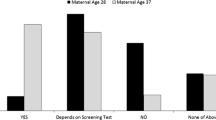Abstract
One factor women consider when deciding whether to pursue amniocentesis is the risk of miscarriage. People use mechanisms like anchoring, or the prior belief regarding the magnitude of risk, as a frame of reference for new information. This study aimed to determine a woman’s perception of miscarriage risk associated with amniocentesis before and after genetic counseling and to determine what factors anchor a woman’s perception of miscarriage risk. One hundred thirteen women being seen for prenatal genetic counseling and possible amniocentesis at six Houston clinics participated in the two-part anonymous survey. While most women (56.7 %) perceived the risk as low or average pre-counseling and indicated the numeric risk of amniocentesis as <1 %, significantly more patients (73 %) correctly identified the numeric risk as <1 % post-counseling (p < 0.0001). However, the majority of patients’ qualitative risk perception did not change after the genetic counseling session (60 %). Those who changed their feeling about the risk after counseling showed a decreased perception of the risk (p < 0.0001). Participants who elected amniocentesis had a significantly lower perception of the risk (p = 0.017) whereas those who declined amniocentesis were more likely to view the risk as high (p = 0.004). The only two anchoring factors that had an effect were having a friend or relative with a personal or family history of a genetic disorder (p = 0.001) and having a child already (p = 0.038); both were associated with a lower risk perception. The lack of significant factors may reflect the uniqueness of each patient’s risk assessment framework and reinforces the importance of genetic counseling to elucidate individual concerns, particularly as non-invasive prenatal testing becomes more widely available and further complicates the prenatal testing landscape.


Similar content being viewed by others
References
Accreditation Council for Genetic Counseling. (2013). Practice-based competencies for genetic counselors. In: Accreditation council for genetic counseling [Web site]. Lenexa, KS: Accreditation Council for Genetic Counseling. Available from: http://gceducation.org/Pages/Standards.aspx.
ACOG Practice Bulletin No. 88: invasive prenatal testing for Aneuploidy. (2007). Obstetrics & Gynecology, 110 (6), 1459–1467.
Austin, J. C. (2010). Re-conceptualizing risk in genetic counseling: implications for clinical practice. Journal of Genetic Counseling, 19, 228–234.
Blessed, W. B., Lacoste, H., & Welch, R. A. (2001). Obstetrician-gynecologist performing genetic amniocentesis may be misleading themselves and their patients. American Journal of Obstetrics and Gynecology, 184(7), 1340–1344.
Eddleman, K. A., Malone, F. D., Sullivan, L., Dukes, K., Berkowitz, R. L., Kharbutli, Y., & D’Alton, M. E. (2006). Pregnancy loss rate after midtrimester amniocentesis. Obstetrics and Gynocology, 108(5), 1067–1072.
Fine, B. A., Baker, D. L., Fiddler, M. B., & ABGC Consensus Development Consortium. (1996). Practice-based compentencies for accredidation of and training in graduate programs in genetic counseling. Journal of Genetic Counseling, 5, 113–121.
Garcia, E., Timmermans, D. R., & van Leeuman, E. (2008). The impact of ethical beliefs on decisions about prenatal screening tests: Searching for justification. Social Science & Medicine, 66, 753–764.
Huber, O., Bar, A. S., & Huber, O. W. (2009). Justification pressure in risky decision making: Search for risk defusing operators. Acta Psychologica, 130, 17–24.
Leschot, N., Verjaal, M., & Treffers, P. (1985). Risks of midtrimester amniocentesis; assessment in 3000 pregnancies. British Journal of Obstetrics and Gynaecology, 92, 804–807.
Niermeijer, M., Sachs, E., Jahodova, M., Tichelaar-Klepper, C., Kleijer, W., & Galjaard, H. (1976). Prenatal diagnosis of genetic disorders. Journal of Medical Genetics, 13(3), 182–194.
Olney, R. S., Moore, C. A., Khoury, M. J., Erickson, J. D., Edmonds, L. D., & Botto, L. D. (1995). Chorionic villus sampling and amniocentesis: Recommendations for prenatal counseling. CDC: Morbidity and Mortality Weekly Report.
Patt, A. G., & Schrag, D. P. (2003). Using specific language to describe risk and probability. Climatic Change, 61, 17–30.
Philip, J., & Bang, J. (1978). Outcome of pregnancy after amniocentesis for chromosome analysis. British Medical Journal, 2, 1183–1184.
Shiloh, S. (2006). Illness representations, self-regulation, and genetic counseling: A theoretical review. Journal of Genetic Counseling, 15(5), 325–337.
Simpson, N. E., Dallaire, L., Miller, J. R., Siminovich, L., Hamerton, J., Miller, J., & McKeen, C. (1976). Prenatal diagnosis of genetic disease in Canada: Report of a collaborative study. Canadian Medical Association Journal, 115, 739–748.
Slovic, P., Fischhoff, B., & Lichtenstein, S. (2000). Cognitive processes and societal risk taking. In P. Slovic (Ed.), The perception of risk (pp. 32–50). London: Earthscan Publication Ltd.
St-Jacques, S., Grenier, S., Charland, M., Forest, J. C., Rousseau, F., & Légaré, F. (2008). Decisional needs assessment regarding Down syndrome prenatal testing: A systematic review of the perceptions of women, their partners and health professionals. Prenatal Diagnosis, 28(13), 1183–1203.
Tversky, A., & Kahneman, D. (1974). Judgement under uncertainty: Heuristics and biases. American Association for the Advancement of Science, 185(4157), 1124–1131.
Weil, J. (2000). Psychosocial genetic counseling. New York: Oxford University Press.
Conflict of Interest
None of the authors have conflict of interest to declare.
Human Studies and Informed Consent
All procedures followed were in accordance with the ethical standards of the responsible committee on human experimentation (institutional and national) and with the Helsinki Declaration of 1975, as revised in 2000 (5). Informed consent was obtained from all patients for being included in the study.
Animal Studies
No animal studies were carried out by the authors for this article.
Author information
Authors and Affiliations
Corresponding author
Rights and permissions
About this article
Cite this article
Nuccio, R., Hashmi, S.S., Mastrobattista, J. et al. Influence of Anchoring on Miscarriage Risk Perception Associated with Amniocentesis. J Genet Counsel 24, 278–284 (2015). https://doi.org/10.1007/s10897-014-9761-0
Received:
Accepted:
Published:
Issue Date:
DOI: https://doi.org/10.1007/s10897-014-9761-0




